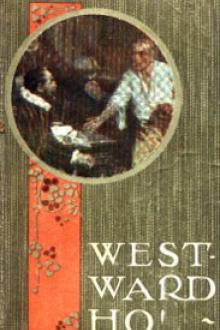Told in the East by Talbot Mundy (best fiction books to read TXT) 📖

- Author: Talbot Mundy
Book online «Told in the East by Talbot Mundy (best fiction books to read TXT) 📖». Author Talbot Mundy
“Is he fit?”
“Fit to fight a bumboat full o' pilots!”
“Could he be sick for an hour?”
“Might be did.”
“Tomorrow?”
“Morning?”
“At about two bells?”
“It could be done.”
“Then do it!”
“Why?”
“Because, Joe Byng my boy, you and I want shore leave; and the pup—and he's a decent pup—must suffer for to make a 'tween-deck holiday. Get my meaning? I've a propagandrum that'll work this tide. You go and set the fuse in the pup's inside; and mind you, time it right, my son—for two bells when the old man's in the chair!”
So Joe Byng, who was something of an expert in the way and ways of dogs, departed in search of an oiler with whom he was on terms of condescension; and he returned to the fo'castle a little later with the nastiest, most awful-smelling mess that ever emanated even from the engine-room of a destroyer in the Persian Gulf (where grease and things run rancid.)
II.
Lying lazily at anchor off the reeking beach of Adra Bight, the Puncher looked peaceful and complacent—which is altogether opposite to what she and her commander were, or had been, for a month. The ship hummed her shut-in discontent, as a hive does when the bees propose to swarm, and her commander—who never, be it noted, went to windward of the one word “damn”—used that one word very frequently.
He sat “abaft the mainmast” at a table that was splotched already with abundant perspiration, and the acting engineer who stood in front of him shifted from foot to foot in attitudes expressive of increasing agony of mind. It grew obvious at last that there was a limit to Mr. Hartley's store of courteous deference.
There had been news, red hot but wrong, of dhows loaded to the water-line with guns and ammunition somewhere up the Gulf. India, ever fretful for her tribes beyond the border, had borrowed Applewaite and his destroyer by instant cablegram, and jealously held records had been broken while the Puncher quartered those indecent seas and heated up her bearings. It was almost too much to have to come back empty-handed. It was quite too much to have to run for shelter under the lee of Adra's uninviting coral reef. And to be told by an acting engineer that he would have to stay a week was utterly beyond the scope of polite conversation.
“Why a week?” asked Commander Applewaite, with eyebrows raised to the nth power of incredulity.
“Why a week?” asked Mr. Hartley, breaking down the barrier of self-restraint at last. “I'll tell you why. Because, although the guts of her are so much scrap-iron, you've a crew of engineers who could build machinery of hell-slag—build it, mind—and could get steam out o' the Sahara, where there isn't any water at all.
“Because—conditional upon the act o' God and your permission—I'm willing to perform a miracle. Because the whole engine-room complement is dancing mad for shore leave, and there'll be none this side o' Bombay; and because, in consequence o' that, creation would be a mild name for what's about to happen under gratings until the shafts revolve again. Man, I wish ye'd take one peep at her bearings, though ye wouldn't understand.
“Because you're lucky; any other engineer in all the navies o' the world would take a month to tinker with her, even if he didn't have to send to Bombay for a tow. Because—”
“That'll do!” said Applewaite, his mind wandering already in search of suitable employment for the crew. “Get the repairs done as soon as possible; we stay here until you have finished what is necessary.”
It looked like an evil moment for asking favors, but it was the time laid down in Regulations when such things as favors may be had; and it was the moment Curley Crothers had picked out for asking for shore leave.
“Come 'ere, Scamp. Come along, Scamp. Come along 'ere—good boy!” he coaxed, dragging by a short chain in his wake the sorriest-looking bull terrier that ever acted mascot in the British or any other navy. Courteous and huge and cap in hand, his weather-beaten face smiling respectfully above a snow-white uniform, he took his stand before the little table. His outward bearing was one of certainty, but his shrewd, slightly puckered eyes alternately conned the expression of his commander's face and watched the dog.
The lee, scuppers were the goal of the dog's immediate ambition, for he was a well-brought-up dog and such of the decencies as were not his by instinct he had learned by painful and repeated acquisition. But at the moment Curley Crothers showed a wondrous disregard for etiquette.
“He's very sick, sir,” he asserted, tugging a little at the chain in the hope of producing instant proof of his contention. But the dog was gamiest of the game, and swallowed hurriedly.
“Well? I'm not a vet. What about it?”
“The whole ship's crew 'ud be sorry, sir, if 'e was to lose 'is number. He's the best mascot this ship ever had, by all accounts.”
“He hasn't brought us much luck this run!” smiled Applewaite, remembering a long list of “previous convictions” and wondering what Crothers might be up to next.
“No, sir? We're still a-top o' the water, sir.”
“Oh! He gets the credit for that, eh? But for him, I suppose we'd have piled up on the reef yesterday?”
“Saving your presence, sir.”
Curley Crothers made a gesture expressive of a world of compliment and praise, but he kept one eye steadily on the dog; he seemed to imply that but for the presence of the dog on board the commander might have forgotten his seamanship.
“Well? What do you suggest?”
“Seeing the poor dog's sick, sir, and you and all of us so fond of him, and all he needs is exercise, I thought perhaps as 'ow you'd order me an' Byng, sir, to take 'im for a run ashore. There'd be jackals and pi-dogs for 'im to chase. A bit o' sport 'ud set 'im up in a jiffy. He's languishing—that's what's the matter with him.”
There were almost tears in his voice as he tugged at the chain surreptitiously, in a vain effort to produce the cataclysm that was overdue. But for all his efforts to appear affected, his eyes were smiling. So were his commander's.
“Why Byng?” he asked.
“Byng cleans him, sir. He knows Byng.”
“Then, why you?”
“Why; he knows me too, sir, and between the two of us, we'd manage
 Nowadays a big variety of genres are exist. In our electronic library you can choose any book that suits your mood, request and purpose. This website is full of free ebooks. Reading online is very popular and become mainstream. This website can provoke you to be smarter than anyone. You can read between work breaks, in public transport, in cafes over a cup of coffee and cheesecake.
Nowadays a big variety of genres are exist. In our electronic library you can choose any book that suits your mood, request and purpose. This website is full of free ebooks. Reading online is very popular and become mainstream. This website can provoke you to be smarter than anyone. You can read between work breaks, in public transport, in cafes over a cup of coffee and cheesecake.




Comments (0)